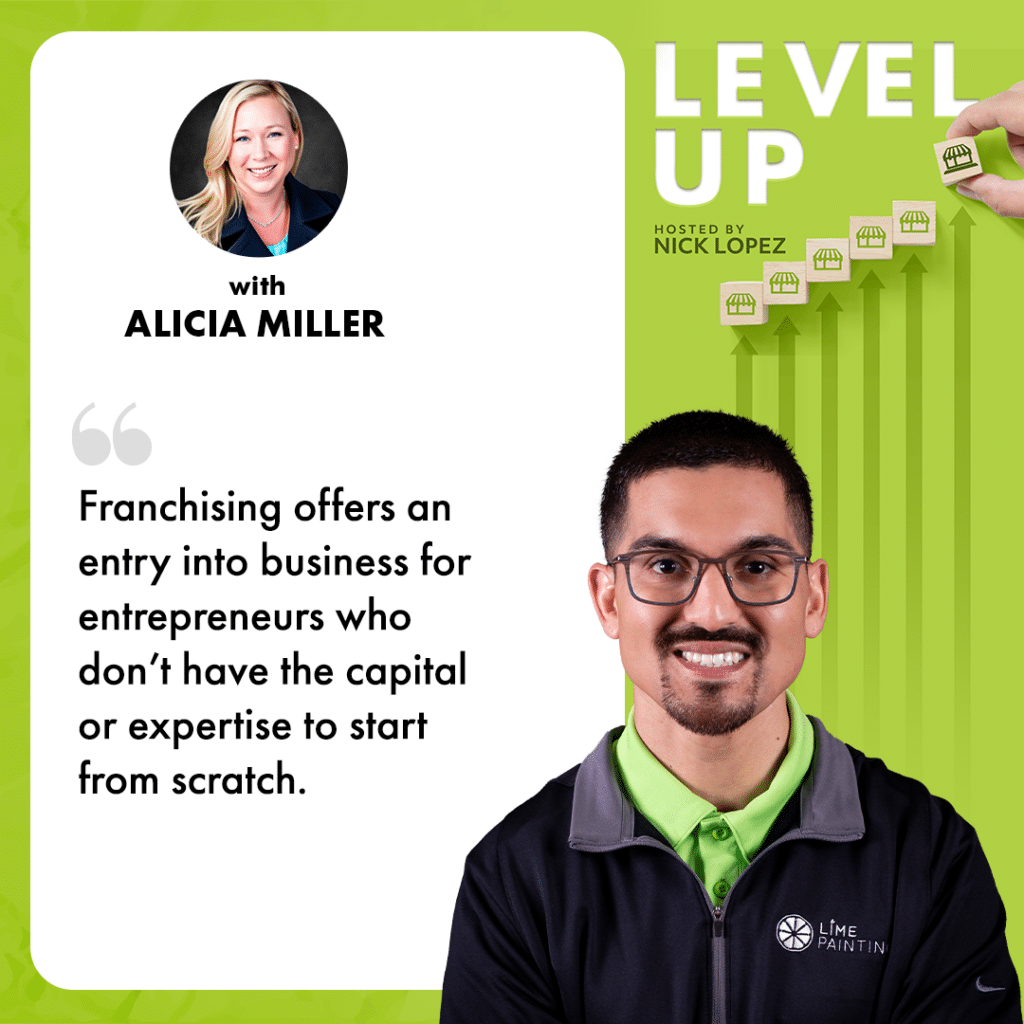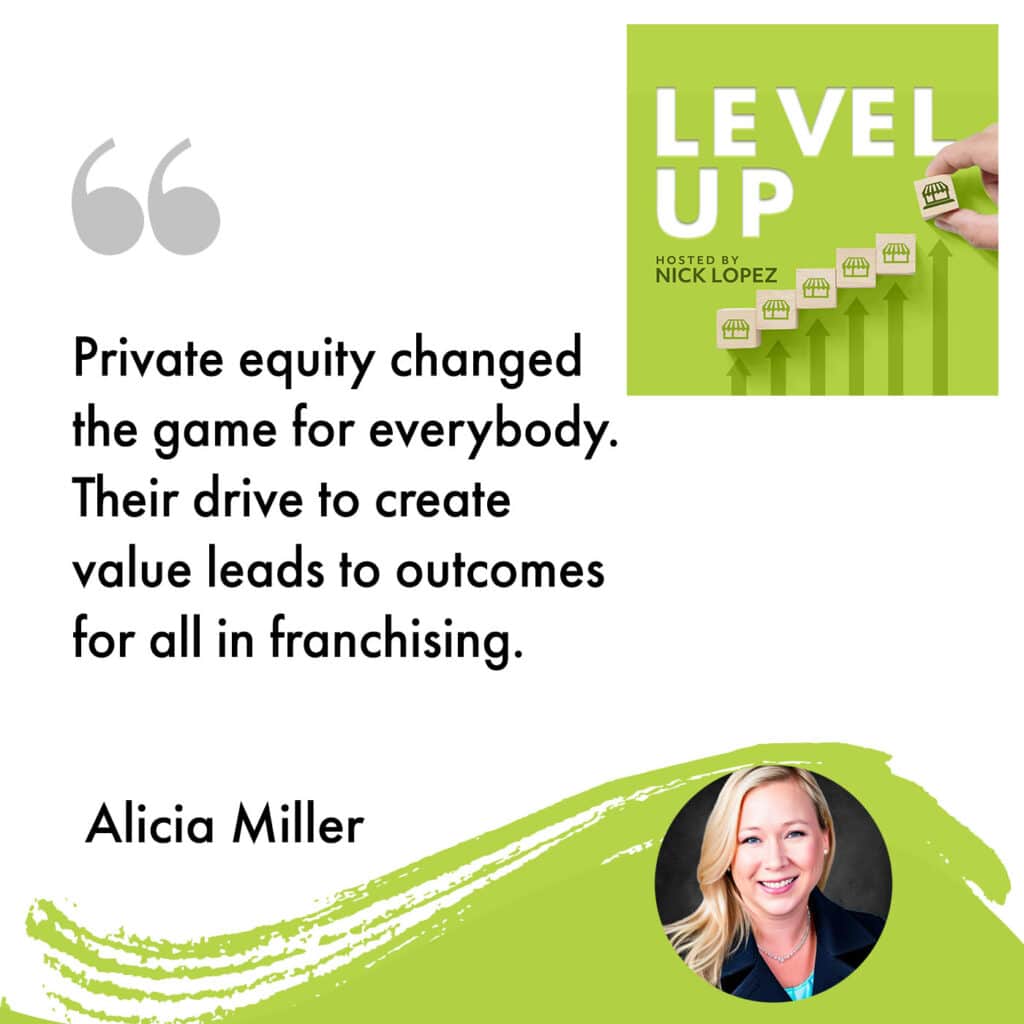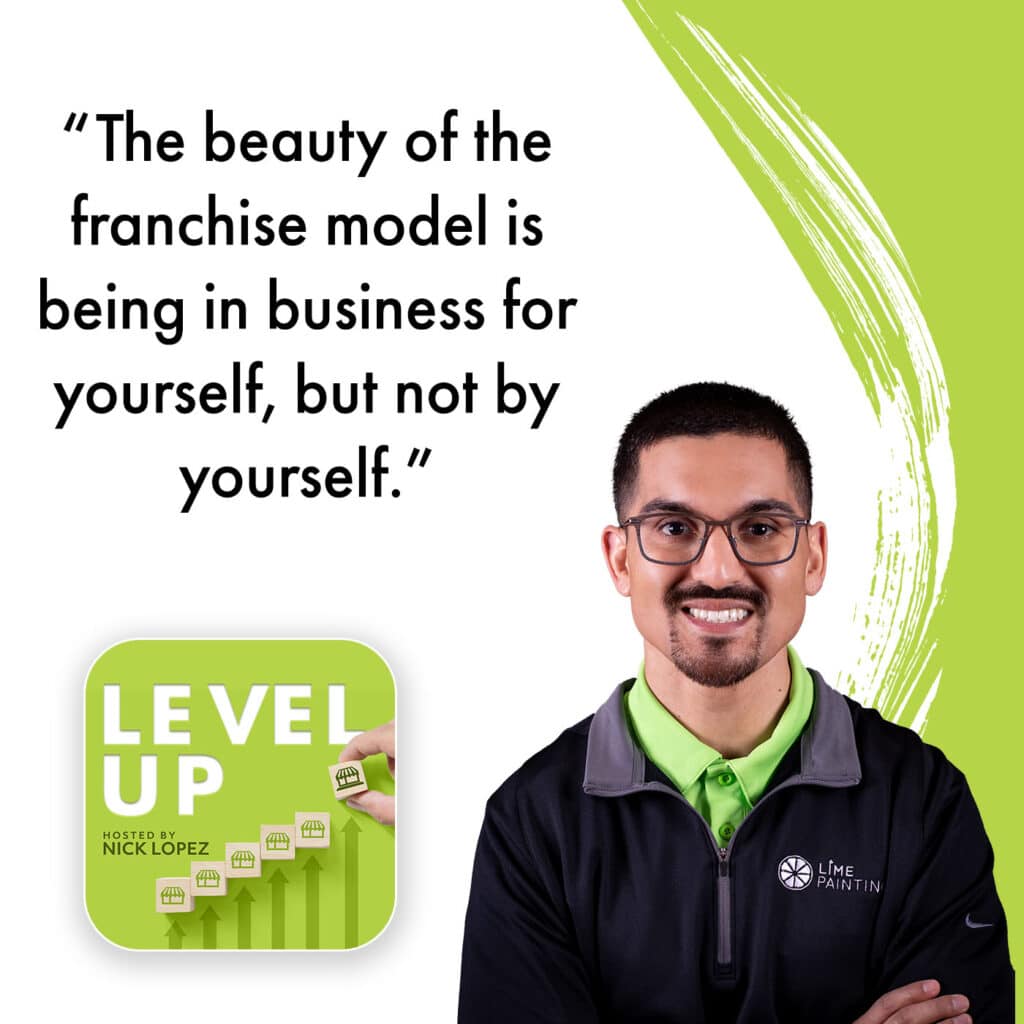
The founder of Emergent Growth Advisors, Alicia Miller, shares how private equity is reshaping the franchise landscape by driving unprecedented success and innovation. With rising competition and heightened expectations, PE-backed franchises are unlocking new levels of profitability and expansion. Listen in on how this investment surge is not only transforming brands but also creating exciting opportunities for franchisees and vendors alike.
—
Watch the episode here
Listen to the episode here
Navigating The Competitive Surge: Revolutionizing Franchise Success
Unlocking New Opportunities and Driving Innovation In A Competitive Market With Alicia Miller
Welcome to the Level Up Show with Nick Lopez, where we have the absolute pleasure of learning from thought leaders in business, franchising, and high-performance personal development. In this episode, we most certainly have a special guest. We have the author of Big Money in Franchising, Miss Alicia Miller. Welcome to the show.

Thanks for having me.
Many folks go through life and don’t understand what a franchise is. Many times, they think that a franchise is simply McDonald’s or Burger King. Frankly, as long as it is moral, ethical, makes money, and delivers value, It can be franchised. Something like a home service company, a health and wellness company, or a fitness company. There are so many different ways to deliver value in the market. Alicia, in many cases, franchising has a unique way of finding you. How did franchising find you?
How Franchising Found Alicia Miller
Like many people, I was looking to make a change. After my daughter was born, I didn’t want to be on airplanes anymore. I was traveling constantly for work. It was great until I had a baby. At this point, it became an untenable work situation. I was looking to work for myself. I wanted more flexibility and I started researching businesses to buy. That’s how I found franchising or franchising found me.
That’s a pretty common path for many mid-career professionals. You’re so tired of the rat race, travel, or whatever is going on, and you want to work for yourself. Franchising has many different categories. Anything can be franchised. Once you discover franchising, then you’re almost overwhelmed with choices because there are so many things you could potentially do. It’s exciting and it’s a vibrant space.
Exciting and vibrant. It hasn’t always been that way. Franchising makes the American dream of entrepreneurship accessible to the everyday American. That is certainly exciting because entrepreneurship is exciting. That hasn’t always been the case. Today, going forward, it is such an incredible time to be in franchising. Alicia, you authored an incredible book. If you do not own it, I recommend that you get your hands on it. Speaking of flying and traveling, I don’t know how many flights, but it wasn’t very many. I read through your book and couldn’t put it down. What led you to author this incredible book?
Entrepreneurship through franchising makes the American dream more accessible to everyone, not just those with endless resources.
The Impact Of Private Equity On Franchising
Franchising has been forever changed by private equity. I didn’t understand that when I came into franchising myself as a franchisee. This book didn’t exist before I wrote it. I felt that because PE has had such a profound influence on franchising, people needed to know about that, and then more importantly, what it means to them. The what. What’s the impact on stakeholders? What’s the impact on employees, franchisees, or the community at large? This book examines the entire history of PE activity in franchising and then breaks it down into a manageable path that allows people to figure out what it means for them personally, and then shares the PE playbook so that people understand what’s coming and can anticipate and make smart choices.
Private equity has transformed franchising, accelerating growth like never before. It’s a game-changer for brands, franchisees, and entire industries.
That is inspiring and you truly did a magnificent job of doing that. I wish I had your book about a year and a half before reading it. I needed it at that time. You do such an incredible job of simplifying and giving direction toward this topic. Knowledge is power. Folks, get your hands on this. It’s going to help you level up in your entrepreneurship and your franchising career. You go on to say in the book that private equity firms are the most dominant and transformative force in contemporary franchising. Why do you say that?
They changed the game for everybody. Whether or not every brand or every franchisee is personally involved with a private equity firm, they still change the whole competitive landscape. Their capital, their expertise, and their drive to create value for their investors lead to outcomes for everybody in franchising.

Private Equity’s Role In Franchise Growth
It used to take many years, sometimes decades, for franchise brands to grow to any real meaningful scale, but once PE entered, they were able to accelerate many brands much faster than they could have on their own. They took large brands that were public or private and were able to make some changes that were necessary, but which the public markets weren’t necessarily rewarding or were too impatient for daily results. The stock market can be very punishing.
When these PE-backed companies and platforms have this growth agenda, that means they’re spending to accelerate their growth. That means marketing and lead generation are more expensive for everybody else. They’re competing for the best real estate. It makes all of the costs for every other franchisor much more expensive.
It forces them to up their game in a good way to compete for franchisee talent and also for talent on the corporate team. To me, despite occasional missteps and mistakes, nobody is perfect. By and large, private equity’s entrance into franchising has helped professionalize and accelerate the franchise sector in a truly meaningful way.
You have to love capitalism and growth. The American dream of entrepreneurship is truly special. When exactly did private equity pursue franchising?
Key Trends In Private Equity And Franchising
They came in in the ‘90s. PE as an industry was founded many years after franchising. Franchising predates private equity by decades, and it took them a while to find franchising. It was like they dipped their toe in the water in the ‘90s, a few restaurant investments, and a few smaller things, but it was Bain who got everybody’s attention.
They did three quite large deals which together were worth about $5 billion. They did so well financially with these deals that it got everybody’s attention. Private equity investors are on the hunt for good ideas. They were like, “Franchising. What a great idea. This is a great model.” Once they found franchising, they piled in like the reverse clown car. They piled in fast. Now, more than 400 firms have invested in franchising across 700-plus brands. They are growing at both the brand level and the franchisee level.
That is inspiring. The entrepreneurs that have made up the franchise space paved a path for value in the market for serving customers, whether that’s through a product or a service. The beauty of the franchise model, being a franchise partnership where folks are in business for themselves but not by themselves and creating mutual enterprise value. That is a powerful model. That is a powerful force. What I love about it is its impact on communities and specifically customers.

When you look at the jobs that are created, and the skillsets that are provided through the training and support of a franchise infrastructure, now you have folks joining organizations where they can develop skills and serve customers and franchise partners, folks who want to build an empire and participate in the greatest expression of what it means to be an American, which is entrepreneurship.
Why Private Equity Is Transforming Franchising
You can do that as a franchise partner. You can scale, grow, change your life, and impact communities. Private equity is strategic and intentional about driving that value and participating in that beautiful model. The wonderful model that is franchising. What an inspiring expression of a growing space, which is franchising. There isn’t a better time to be in franchising, and it is only getting better.
I agree with that. Franchising is getting better and better at improving itself. One of the things that most impressed me when I came in as a franchisee was how vibrant the community is, and how much everybody helps each other. You’re competing for business. You’re competing for customers, but the openness with which people share best practices with each other is remarkable. I’m not sure it’s duplicated anywhere else in business.
There is much to learn and many great resources available no matter where you decide you want to play in the franchise sector. There are resources to help you be your best and achieve the outcomes that you are personally looking to get. You have to search for them and you have to engage with the franchise community in a big way, and it will give back over and over.
When you join a franchise organization, you learn that the core of it is different. That whole partnership mentality of collaborating within a franchise organization is a skill, and it’s clearly at the heart of franchise relations. It spills out into the entire industry and is expressed that way. Certainly, that makes it special. I’m excited that private equity figured that out.
They love partnering with entrepreneurs, and entrepreneurs have skin in the game. They’re engaged. Especially when you think about a franchisee in their local market and how engaged they are in their communities, that is attractive to an investor. With the scale, private equity has figured it out. Now that they’ve learned about franchising, they’ve learned they are replicable best practices.
Once you learn them, you can duplicate this playbook over and over in multiple investments in franchising, even across different sectors. You can invest in child services or auto detailing. The range of franchises is truly astonishing once you understand that best practice set. Subsectors have their nuances and things you’ve got to do to be successful, but that franchise model is very special.
That’s why you see many franchise investors coming in. Once they’ve made one investment, you see it start to snowball in, and then they make more. The largest investor in the space is Roark. They’ve got more than 130 companies or brands that they’ve invested in. The second would be Riverside. They’ve made more than 50 investments in franchising, and it’s astonishing to me. It shows that once you get good at it, then you can continue to leverage that knowledge.
One of the beauties of entrepreneurship and sales is activity. As a result, entrepreneurship franchising benefits from compounding. As you were talking, I was thinking about the power of compounding within the franchise space currently. It is only continuing to compound going forward because it is an incredible accelerator of value for customers in the marketplace. It creates life-changing opportunities in communities. It is all about franchise owner profitability. I want to transition, Alicia, and talk about some trends in private equity that you’re seeing in franchising currently.
Now that so many firms have invested, they’ve done a pretty great job of picking over the space. The result of that is it’s very much more competitive. Every time a high-quality brand goes to market, there is a lot of interest. I don’t see that trend going away. The second trend is we have this interesting dynamic now. When interest rates came down, prices went up because it’s less expensive to use leverage debt to acquire larger brands.
It’s not as much a factor. With small brands, PE can pay cash for those, but in some of the larger investments that allowed for cheaper debt. What that meant was that prices went up. PE firms leaned in pretty hard in the second half of 2020. Through 2021, those prices were a little eye-popping at times. They were getting some pretty impressive multiples. Now, they have to live up to their business case.
What we’re seeing is a very hard-charging drive to unlock that growth and to achieve the business case that they underwrote when they acquired the business. That is driving a lot of activity with third-party sellers, marketing firms, and lead generation. It’s making the talent market for corporate employees very competitive as well. Everyone is working very hard to try to recruit the best possible franchisee talent they can find because that’s what moves the brand forward.
As you can see, that is only good for the franchise space. It is truly an inspiring time to be in the franchise world. I would love to hear your thoughts, Alicia, on private equity and big money in franchising and how it benefits franchise owners.
Founders are benefiting from access to capital and help to grow the business. You can take some risk off the table for yourself and your family. You can sell a portion of the business and then get some help to continue to grow it. Not as many are interested in minority investment. Most want majority control investment, but some out there are willing to consider the minority. For franchisees, it’s interesting.
For franchisees, in theory, most of the things that private equity will want to do to grow the business should benefit you as a franchisee because if you’re not happy and if you’re not satisfied with your profitability, you will refuse to grow. You won’t add any more units, and you will be a bad validator. Most firms that are very savvy and want this business to grow will do everything they can to help franchisees be profitable and well-supported so that they’re willing to continue to grow.
It’s important as a franchisee when you’re looking at the landscape and trying to figure out what brand might be a good fit for you to understand where that brand is in its journey, or its life cycle. Whether or not it is currently PE-owned or could be at some point is a consideration now. People didn’t think about it before, but now, it needs to be part of their decision criteria.
What are some considerations that come to mind?
Franchisee profitability should be at the center of everything that the management team is doing. Everything they’re thinking and doing all day long, that’s their job. If it’s not, run for the hills. That is true no matter who owns the franchise. Whether it’s publicly traded, PE-backed, or founder-backed, it doesn’t matter. You’ve got to keep that right in the middle of your decision criteria when you are interviewing that franchise and all the franchisees to understand what that business is like to run.
As I said, smart PE sponsors will put a management team in place or back a great management team where that’s what they spend all their time on. When PE loses its way, it’s the same way everybody loses their way. They forget that fundamental best practice, truth, center of gravity, or however you want to say it, that if franchisees are not satisfied, profitable, and feel like it’s a good relationship, they don’t want to grow. If you make decisions that dent franchisees’ enthusiasm, confidence in management, confidence in the business, etc, that’s when a stall out happens.
As you talk about in your book, you do such a great job of making it simple and understandable. You give some great examples of how private equity has leveled up in exactly what you were talking about. That is what inspires me about the current state of franchising. There is incredible momentum across many organizations that are driving incredible value to franchise partners.
That means that customers and neighbors of customers are changing their lives through the skillsets, the value, and the products that are being delivered all across the world. That’s also what’s exciting about the franchise space. It is becoming easier and easier for the everyday American to become a franchise owner. Internationally, that is becoming easier and easier as well.
There are so many great trends in franchising. As I mentioned, you have such a talent for making something that is not easy to talk about and captivating the person who’s reading it. When I was reading your book, I couldn’t put it down. I learned so much. Thank you for the work and your skills. You are truly talented. I thank you for your service to the franchise space. I leveled up in my career because I read your book. I love it. Alicia, if I haven’t mentioned it, you inspire me. I know you’re going to inspire many other franchise owners and many other entrepreneurs. You can tell that was your intent behind this book.
Thanks. I appreciate that. Everybody has a superpower. Mine is unpacking complexity, and turning it into, “What do I do now?” That’s what I do and that’s what I love. This is the book that I wish I’d had when I started franchising. I wrote it with that in mind. It also has a lot of case studies. One of the things that irritates me about some private equity players is they try to make everything look complicated.
They use a lot of finance geek talk lingo. Not everybody wants things presented in that way, but there are plenty of case studies that run through the math to make it easy to understand how they’re making their money, and how you can make money alongside them, with them, or knowing that they’re in the space. The complexity I think is unnecessary or the show of complexity. Just unpack it and follow the playbooks, and you can hopefully get the outcomes that you’re looking for.
Big Money Opportunities For Franchisees
I wish I had something like this when I was starting franchising. That was my intent. For somebody who’s looking to achieve big money in franchising, whether that is a franchise partner, franchisor, or anybody in this space, the franchise model touches so many folks, but what mindset shift recommendations do you suggest to achieve that?
There are probably three. First, you have to go all in. If you’re not going to put 110% of yourself into a franchise business, or if you’re going to be a vendor or a franchisee, whatever you’re doing in franchising, you shouldn’t be going in halfway. You’re not going to get the results that you would if you were less engaged. You have to be willing to roll up your sleeves and do everything you can to learn the business or whatever sector franchising you’re in and do it well. Otherwise, you’re limiting yourself. There’s no reason to do this halfway.
The second thing I would say is whatever you’re trying to build, build with the end in mind. This is particularly true for franchisees and franchise founders. At some point, you’re going to need to retire and you want to have a good sale outcome, but too many folks get into franchising without thinking about that end game. It impacts everything you’re doing.
Building with the end in mind changes everything. Plan your franchise for the long haul, and you’ll be better prepared to scale and succeed.
How you run your business, how you build your team, what franchise you select in the first place, and then how you think about presenting yourself to the world when you’re ready to go to market and exit the business. The earlier you can think about it and the more you can build with the end in mind, the better off you’re going to be.
The last thing is all of us benefit from having an outsider’s perspective. You have to learn to see your business through the eyes of professional investors. To me, it’s a very easy clarifying way to clear out the noise and your own emotions about your business and think more holistically about where are the real levers I can pull to drive better value in my business. If you’re a stakeholder or let’s say you’re a vendor, the same thing applies to you. You put a twist on it.
Franchising success means seeing your business through the eyes of investors. Step back, focus on the key levers that drive value.
Where can I help my clients build value in their business? What are the levers that they can pull so that I can help them pull or that I can accelerate for them so they can be successful? It’s the same mindset, and it’s easy to get too down in the weeds or too in your head about your business. or your ego can take over. Everyone would benefit from having an outside perspective of looking at their business as if they were going to market and how an investor would look at it.
I told you this was going to be good. The industry aligns with that simple principle of creating value, solving problems, and creating life-changing opportunities for folks who are a part of these franchise organizations. To your point, suppliers, vendors, and partners in the space are critical to a brand’s success to franchise owner profitability.
The partners or the vendors realize that it’s all about the relationship with franchise partners. We’re working toward profitability with some owners. We’re crushing it with profitability with other owners. In that process, wherever it is, it’s a partnership in pursuing profits, doing that at the franchise partner level. Speaking of franchise partners, franchise partners increasingly are benefiting from private equity.
That’s true. PE is also acquiring and investing in enablers. If you think about the key enablers across franchising, marketing firms, firms that help people start franchise businesses, lead generation firms, broker networks, and technology, all those guys have been touched by private equity in some way or another. There have been some big acquisitions there. They also benefit from having clients who are PE-backed. It drives up prices, but the expectations are also high.
Suppliers need to think very carefully about how they’re positioning themselves and how they can demonstrate proof that they build value in these businesses. They can put it on a flywheel and help these businesses grow in a meaningful way. Support franchisees, whatever it is that vendor does. Once they can prove that, then the world opens a lot bigger because if you’ve got a PE investor who will vouch for you and will continue to bring you in as a preferred vendor because you do such a great job, then your business is going to expand much faster.
The opposite is also true. If you don’t deliver, that word spreads. PE firms talk to each other. If you think that franchising is a small community, private equity is even smaller. Vendors need to be very careful about making sure that they’re delivering the value they said they would deliver because it’s one phone call away from being kicked out of consideration.
If a brand is looking at you, all they’ve got to do is pick up their phone, call the buddy that they went to college with who’s over in another PE firm that owns another franchise brand, and they’ll get the scoop. You could be kicked out. You’ll never know how it is that you didn’t get to bid on that business or why your bid wasn’t successful. It has changed the game also for vendors, but vendors who do it well and who can show their value can make quite a nice living for themselves, working together with private equity and the brands that they back in their platforms.
You can see why private equity is such an inspiring accelerator and certainly a dominant innovation machine. It is all about creating synergy with franchise partners. Alicia, it would be silly if I didn’t ask you this. Why do you love franchising so much?
I love a small business. I love entrepreneurs. I’m one myself, and I’m from a family of entrepreneurs. My dad was an entrepreneur as well. To me, franchising is the most dramatically brilliant business model ever created to enable people to become entrepreneurs. Not everybody wants to invent a new concept from scratch. Some people just want the playbook, “Give me the playbook, and I’ll go run the business.” When franchising is done well and when the relationship is good with franchisees, it can be such a powerful success engine for people.
I love how franchising accelerated the quick-service restaurant space and has accelerated many other spaces. That acceleration is creating business opportunities and jobs for communities all around the country. More and more of that internationally. It is truly an exciting time to be in franchising. Alicia, thank you for this incredible book and product that you put into the world. It helped me level up, and I know it will help many other folks level up as well. If anyone would like to get in touch with you, how can they do that?
Go to BigMoneyInFranchising.com. That’s pretty easy to remember. There’s a contact form there. You can find me on LinkedIn, or my consulting firm is called EmergentGrowthAdvisors.com. You can find me there as well.
This is a book that will certainly level up your career. Check it out. Hop on to the website. Subscribe to the Level Up Show. Like this episode and contribute to the conversation. As always, level up.
Important Links:
- Alicia Miller – LinkedIn
- BigMoneyInFranchising.com
- EmergentGrowthAdvisors.com
- Big Money in Franchising
About Alicia Miller
 Alicia Miller is the founder and managing director of Emergent Growth Advisors, a boutique strategic advisory firm working at the intersection of franchising and private equity. Her five-star book, “Big Money in Franchising,” is a cult classic in the franchising world because her expertise is providing the tools and tips that are crucial in navigating growth in franchising. She supports founders and franchise management teams facing growth, disruption, or transformation challenges and helps them accelerate their businesses. She also advises private capital firms pre- and post-transaction on strategy and value creation initiatives and co-invests alongside her partners. As a former multi-unit franchisee, she brings a franchisee’s perspective and operating experience into every engagement.
Alicia Miller is the founder and managing director of Emergent Growth Advisors, a boutique strategic advisory firm working at the intersection of franchising and private equity. Her five-star book, “Big Money in Franchising,” is a cult classic in the franchising world because her expertise is providing the tools and tips that are crucial in navigating growth in franchising. She supports founders and franchise management teams facing growth, disruption, or transformation challenges and helps them accelerate their businesses. She also advises private capital firms pre- and post-transaction on strategy and value creation initiatives and co-invests alongside her partners. As a former multi-unit franchisee, she brings a franchisee’s perspective and operating experience into every engagement.
